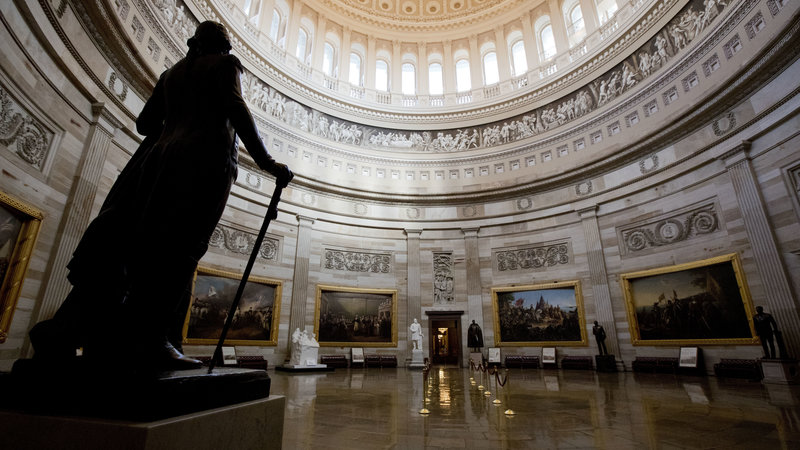
Violence Against Women Act Expires Because Of Government Shutdown
PHOTO: The empty U.S. Capitol Rotunda is seen in Washington during a partial government shutdown Monday, Dec. 24, 2018. The shutdown has affected the administration of the Violence Against Women Act, which expired Friday at midnight. CREDIT: Manuel Balce Ceneta/AP
BY JENNY GATHRIGHT, NPR
The partial shutdown of the U.S. government, which is affecting more than 800,000 federal workers and numerous government agencies, also has consequences for the Violence Against Women Act, which expired midnight on Friday.
Separately, both the House and the Senate passed spending deals that included clauses that would have extended VAWA until Feb. 8.
But because the law’s future became inextricably tied to the larger budget debate, which hinges on a dispute between Democrats and Republicans over funding for a border wall, it was not reauthorized.
VAWA funds and administers numerous programs assisting survivors of domestic violence and sexual assault. Its expiration does not prevent all of these programs from being administered — according to The Washington Post, grants already awarded under the law will not be affected. But moving forward, payment requests from programs that receive VAWA funding will be delayed until the law is reauthorized.
According to Roll Call, the Department of Justice and the Department of Health and Human Services administer most VAWA programming. Some VAWA programs that HHS administers may continue to receive funding even though VAWA expirations have expired; Congress approved fiscal 2019 funding for HHS in September. But funding for the Department of Justice is tied to the current budget debate.
In a letter she sent to House Speaker Paul Ryan in September, House Democratic leader Nancy Pelosi criticized Republicans for only pursuing short-term reauthorization of VAWA.
When the act was set to expire earlier this year on Sept. 30, it was extended until Dec. 7. And before it expired on Dec. 7, it was once again extended by a short-term bill. That extension ran out on December 21 as the government went into its partial shutdown.
In her letter, Pelosi references a bill introduced by Rep. Sheila Jackson Lee (D-TX) in July. The bill extends and expands VAWA, introducing additional measures that prohibit the sale of firearms to people subject to protection orders and to persons convicted of stalking.
Roll Call reported earlier this month that the gun-related clauses were the likely reason no Republicans supported Jackson Lee’s bill. It was never brought to the House floor.
In September, 46 House Republicans signed a letter addressed to House Speaker Paul Ryan and Majority Leader Kevin McCarthy, urging them to reauthorize VAWA. “This is not a partisan issue,” the letter says. “VAWA has been continually reauthorized on a bipartisan basis in Congress. We must act now to maintain and strengthen this critical law.” The letter did not encourage the adoption of a specific bill.
The last time VAWA was reauthorized was in 2013, and it took a bit of a political battle. As NPR’s Eyder Peralta reported, some Republicans took issue with provisions that offered new protections for Native women and lesbian, gay, bisexual and transgender people.
The Violence Against Women Act was first passed in 1994 by a Congress with an unprecedented number of women. Most of the women who served in that Congress were elected in 1992, the year after Anita Hill’s testified before Congress during Supreme Court Justice Clarence Thomas’s confirmation hearings.















